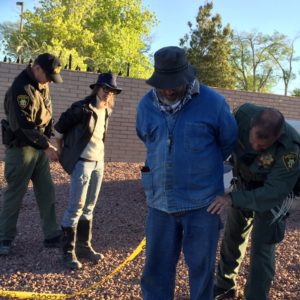Remember when coups and assassinations were secretive, when presidents were obliged to go to Congress and tell lies and ask permission for wars, when torture, spying, and lawless imprisonment were illicit, when re-writing laws with signing statements and shutting down legal cases by yelling "state secrets!" was abusive, and when the idea of a president going through a list of men, women, and children on Tuesdays to pick whom to have murdered would have been deemed an outrage?
All such resistance and outrage is in the past by mutual consent of those in power in Washington, D.C. Whoever becomes the next president of the United States could only unfairly and in violation of established bipartisan precedent be denied the powers of unlimited spying, imprisoning, and killing. That this is little known is largely a symptom of partisanship. Most Democrats still haven't allowed themselves to hear of the kill list. But the widespread ignorance is also a function of media, of what's reported, what's editorialized, what's asked about in campaign debates, and what isn't.
The new book, Assassination Complex: Inside the Government's Secret Drone Warfare Program, from Jeremy Scahill and the staff of The Intercept, is terrific to see even more for what it represents than for what it actually teaches us. We've already learned the details it includes from the website of the Intercept, and they fit with similar details that have trickled out through numerous sources for years. But the fact that a media outlet is reporting on this topic and framing its concerns in a serious way around the dangerous expansion of presidential and governmental power is encouraging.
The United States is now working on putting into action drone ships and ships of drone planes, but has never worked out how in the world it is legal or moral or helpful to blow people up with missiles all over the earth. Drone wars once declared successful and preferable alternatives to ground wars are predictably evolving into small-scale ground wars, with great potential for escalation, and nobody in any place of power has considered what candidate Obama might have called ending the mindset that starts wars, perhaps by using the rule of law, aid, disarmament, and diplomacy.
I recommend starting The Assassination Complex with the afterword by Glenn Greenwald, because he reminds us of some of Senator and candidate Obama's statements in favor of restoring the rule of law and rejecting President George W. Bush's abuses. What Obama called unacceptable at Guantanamo, he has continued at Guantanamo and elsewhere, but expanded into a program that focuses on murder without "due process" rather than imprisonment without "due process."
"Somehow," writes Greenwald, "it was hideously wrong for George W. Bush to eavesdrop on and imprison suspected terrorists without judicial approval, yet it was perfectly permissible for Obama to assassinate them without due process of any kind." That is in fact a very generous depiction of the drone murder program, as The Assassination Complex also documents that, at least during one time period examined, "nearly 90 percent of the people killed in airstrikes were not the intended targets." We should think of drones more as random killing machines than as machines killing particular people who are denied the right to a trail by jury but are suspected of something by somebody.
"It is hard," writes Greenwald, "to overstate the conflict between Obama's statements before he became president and his presidential actions." Yes, I suppose so, but it's also hard to overstate the conflict between some of his campaign statements and others of his campaign statements. If he was going to give people a fair hearing before abusing their rights, what are we to make of his campaign promises to start a drone war in Pakistan and escalate the war in Afghanistan? Greenwald is assuming that the right not to be murdered ranks somewhere fairly high alongside the right not to be spied on or imprisoned or tortured. But, in fact, a war-supporting society must understand all rights to have particular protection except the right to stay alive.
The advantage that comes from viewing small-scale drone murders as an escalation of small-scale imprisonment -- that is, as a violation of rights -- really comes when you carry logic one step further and view large-scale killing in war as also a violation of rights, as indeed murder on a larger scale. In fact, among the top areas in which I would add to Greenwald's summary of Obama's expansions of Bush powers are: torture, signing statements, and the creation of new wars of various types.
Obama has made torture a question of policy, not a crime to be prosecuted. Frowning on it and outsourcing it and hushing it up does not deny it to the next president in the way that prosecuting it in court would.
Obama campaigned against rewriting laws with signing statements. Then he proceeded to do just as Bush had done. That Obama has used fewer signing statements is largely due, I think, to the fact that fewer laws have been passed, combined with his creation of the silent signing statement. Remember that Obama announced that he would review Bush's signing statements and decide which to reject and which to keep. That is itself a remarkable power that now passes to the next president, who can keep or reject any of Bush's or Obama's signing statements. But as far as I know, Obama never did actually tell us which of Bush's he was keeping. In fact, Obama announced that he would silently assume any past signing statement to apply to a new and relevant law without restating the signing statement. Obama has also developed the practice of instructing the Office of Legal Counsel to write a memo in place of a law. And he's developed the additional technique of creating self-imposed restrictions, which have the benefit of not being laws at all when he violates them. A key example of this is his standards for whom to kill with drones.
On the question of starting wars, Obama has radically altered what is acceptable. He began a war on Libya without Congress. He told Congress in his last state of the union speech that he would wage a war in Syria with or without them (which statement they applauded). That power, further normalized by all the drone wars, will pass to the next president.
Lawyers have testified to Congress that drone killing is murder and illegal if not part of a war, but perfectly fine if part of a war, and that whether it's part of a war or not depends on secret presidential memos the public hasn't seen. The power to render murder possibly legal, and therefore effectively legal, by declaring the existence of a secret memo, is also a power that passes to the next president.
In reality, there is no way to even remotely begin to legalize drone murders, whether or not part of a war. The seven current U.S. wars that we know of are all illegal under the UN Charter and under the Kellogg-Briand Pact. So, any element of them is also illegal. This is a simple point but a very difficult one for U.S. liberals to grasp, in the context of human rights groups like Amnesty International and Human Rights Watch taking a principled stand against recognizing the illegality of any war.
If, on the other hand, the drone murders are not part of an illegal war, they are still illegal, as murder is illegal everywhere under universal jurisdiction. The defense that a foreign dictator, exiled or otherwise, has granted permission to murder people in his country, so that sovereignty is not violated, misses the basic illegality of murder, not to mention the irony that helping dictators kill their people conflicts rather stunningly with the common U.S. excuse for launching wars of overthrow, namely punishment of a dictator for the ultimate sin of "killing his own people." Sovereignty is also an idea very selectively respected; just ask Afghanistan, Iraq, Libya, or Syria.
Reporter Cora Currier, in The Assassination Complex, looks at Obama's self-imposed, but never met, restrictions on drone murders. Under these non-legal limitations it is required that drone missiles target only people who are "continuing, imminent threats to the American people," and who cannot be captured, and only when there is "near certainty" that no civilians will be killed or injured. Currier points out that Obama approves people for murder for months at a time, rendering dubious the already incoherent idea of a "continuing imminent threat." It's not clear that "capture" is ever a serious option, and it is clear that in many cases it is not. The "near certainty" about not killing civilians is thrown into doubt by the constant killing of civilians and, as Currier points out, by the White House claiming to have had that "near certainty" in a case in which it killed civilians who happened to be American and European, thus requiring some accountability.
Scahill and Greenwald also document in this book that sometimes what is targeting is a cell phone believed to belong to a particular person. That of course provides no "near certainty" that the targeted person is there or that anyone else isn't.
What might begin to restrain this madness? Will those who opposed Bush lawlessness but turned a blind eye to its expansion under Obama find themselves opposing it again? That seems highly unlikely under the best of the three remaining big-party presidential candidates, Bernie Sanders. I can't imagine ever getting a significant number of his supporters to even become aware of his foreign policy, so good is he on domestic issures. With Hillary Clinton the task would be extremely difficult as well, aided only by the likelihood that she would launch truly big-scale wars. With a President Trump, it does seem much more conceivable that millions of people would suddenly find themselves opposing what has been firmly put into place the past 16 years. Whether it would then be too late is a different question.













